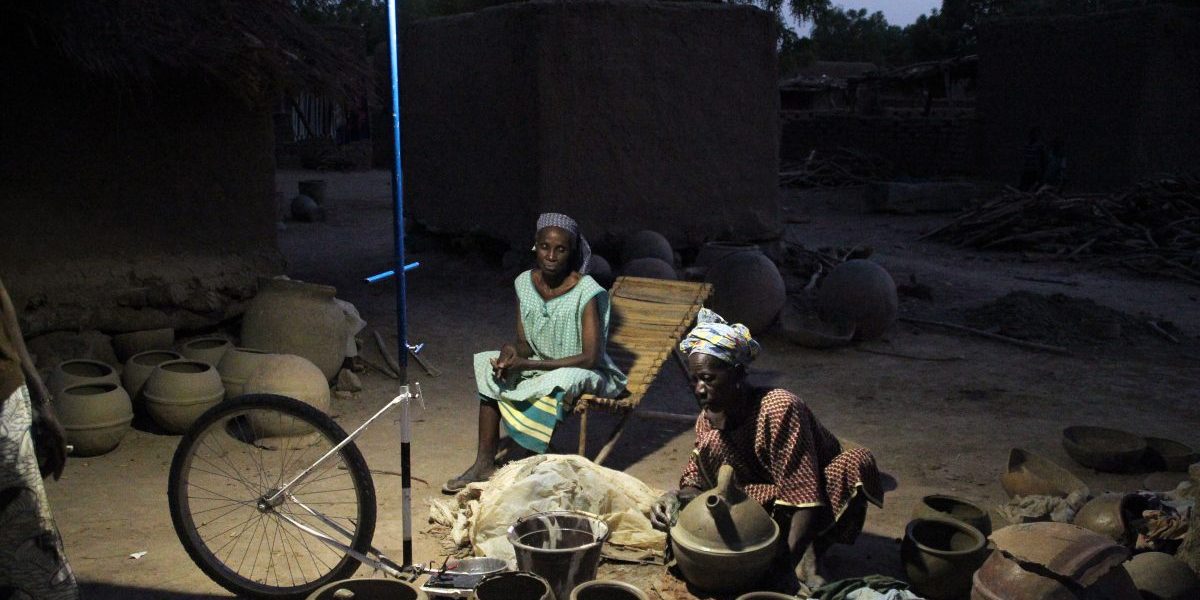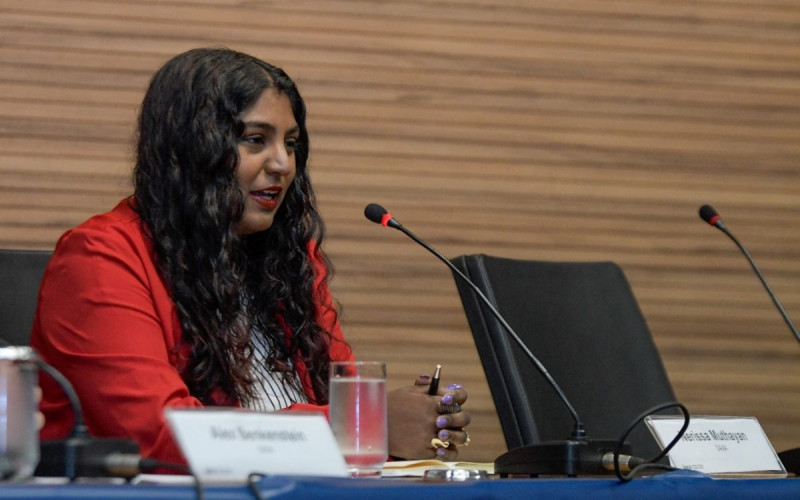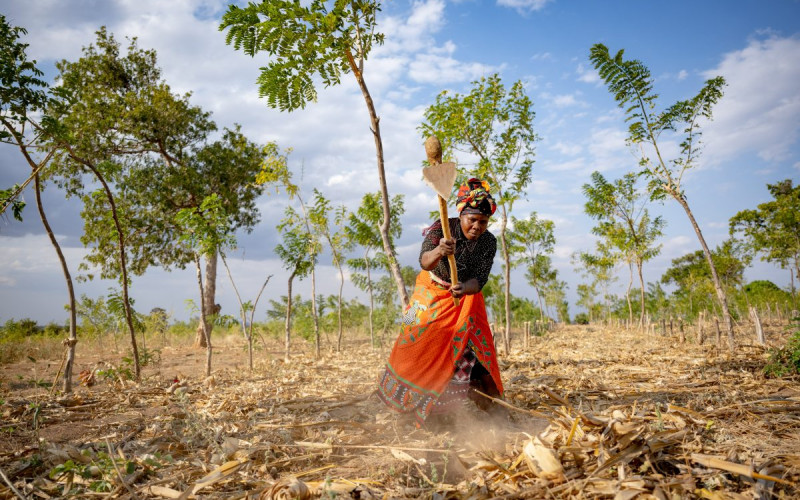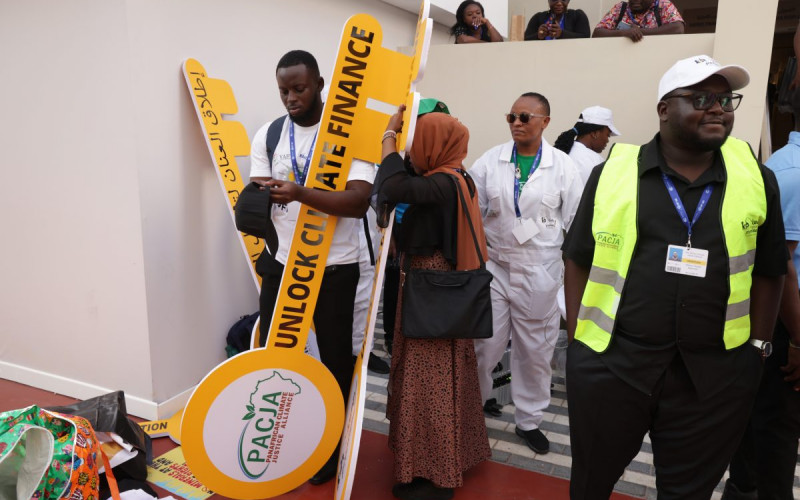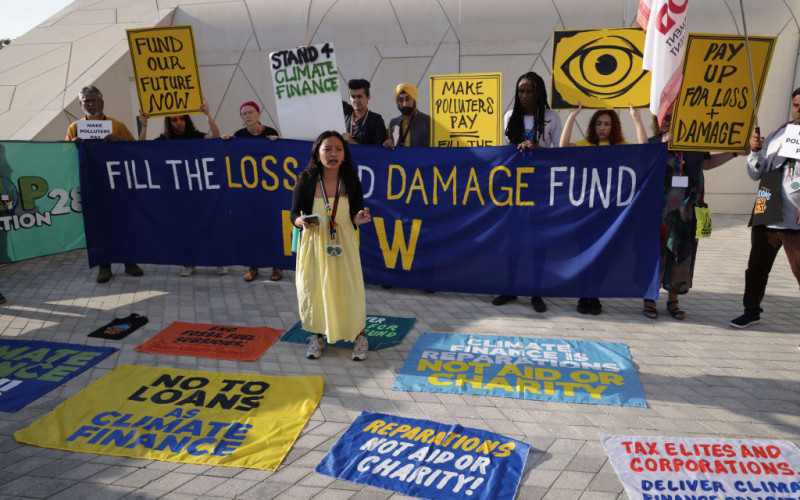Recommendations:
- Mandatory contributions towards employee reskilling will help to promote private sector support for the green transition.
- Gender dimensions of the AU-EU strategic pillar on green transition and energy access should be elaborated as part of ongoing development of the AU-EU strategic partnership.
- More widespread use of gender-based targets should be promoted though AU-EU collaboration on green transition and energy access, as well as supporting the necessary monitoring and evaluation of such policies to support implementation.
- Gender dimensions must receive recognition in policies and programmes related to skills development, re-skilling, and science, technology, engineering, and mathematics (STEM) education.
Executive summary
Women remain under-represented in energy value chains, and this is true also for the Africa region. While a range of policies and initiatives are being implemented to promote gender mainstreaming in the energy sector, there is a need to focus on effective implementation and the necessary support to ensure that these policies result in tangible changes in the energy sector. Gender dimensions of the green transition are reflected to an extent in AU-EU strategic frameworks and partnerships, yet there are important opportunities to strengthen this element of the regional partnership.
Introduction
With more than 600 million people in Africa lacking reliable access to electricity and heightened awareness of the vulnerability of the continent to climate change, there is growing interest in the role that renewable energy technologies can play in contributing to a green transition and broader sustainable development in Africa. There is a substantial gap between existing skills and technology levels and emerging practices in the transition to a greater reliance on renewables, necessitating a focus on reskilling, technology transfer and education in the context of a just transition.
This briefing calls for knowledge and skills transfer in Africa towards achieving sustainability in the transition to green energy. It further explores the role of women within Africa’s green transition, with a focus on monitoring and evaluation to support effective implementation of gender-based policies in Africa’s energy sector.
Opportunities and skills-related challenges of the green transition
Given the high rates of unemployment across the Africa region, and particularly a dearth in quality jobs, every employment opportunity counts. Achieving the sustainable green energy transition in economies historically reliant on fossil fuels, such as Nigeria, will gain momentum when the threat of resulting unemployment due to such transition is comprehensively tackled. Concerns around the social and economic costs of the transition generate political resistance, which delays the necessary policy changes. It is in the interest of these economies to navigate this transition without delay, given current market dynamics – beyond the short and medium term impact of the COVID-19 pandemic on oil and gas prices, earlier trends such as the increased production of shale gas by the US has put downward pressure on oil and gas prices and affected the profitability of oil and gas producing operations in Africa.1International Energy Agency (IEA), Africa Energy Outlook 2019, World Energy Outlook Special Report, (Paris: IEA, 2019), https://www.iea.org/reports/africa-energy-outlook-2019.Additionally, institutional investors are increasingly divesting from fossil fuels due to its impact on climate change, raising the spectre of stranded assets.
The International Labour Organization has emphasised that renewable energy projects can offset job losses from a decline in fossil fuel-based energy technologies and can in turn create a net employment gain.2International Labour Organization, Green Jobs and Renewable Energy: Low Carbon, High Employment, http://ilo.org/wcmsp5/grou ps/public/—ed_emp/—emp_ent/documents/publication/wcms_250690.pdf.However, concern remains over the quality of jobs that will be generated and the speed with which these projects can be initiated, due to delays in developing appropriate policies and supporting an attractive investment climate in Africa.3Energiewende, ‘Africa’s Energy Transition: Opportunities and Challenges for Decent Work,’ Energy Transition, The Global Energiewende, November 29, 2018, https://energytransition.org/2018/11/africas-energy-transition/.Recommendations such as unemployment benefits, relocation grants and employment search support4Georgia Piggot et al., ‘Realizing a just and equitable transition from fossil fuels’ (Discussion Brief, Stockholm Environment Institute, Stockholm, 2019); and International Renewable Energy Agency (IRENA), The European Commission, the International Labour Organization and Norad, ‘Interlinkages Between Energy and Jobs’ (Policy Brief 13, UN High-Level Political Forum, New York, 2018), https://sustainabledevelopment.un.org/content/documents/17495PB13.pdf.are suggested in Europe for workers affected by the renewable energy transition under the framework of a just transition. Outside of South Africa, however, governments in sub-Saharan Africa largely do not have in place adequate social systems or protective labour market policies through which these recommendations can be implemented.
With the above dynamics at play, adequate country-specific skills substitution is necessary to foster a migration to a low carbon energy portfolio. In this regard, AU-EU partnerships5UN Development Program (UNDP) Uganda, ‘SWITCH Africa Green: Promoting inclusive and sustainable economic development’, https://www.ug.undp.org/content/uganda/en/home/operations/projects/SustainableInclusiveEconomicDevelopmentProgramme/SWITCHAfricaGreenPromotinginclusiveandsustainableeconomicdevelopment/; and The Africa-EU Partnership, ‘AU-EU Skills for Youth Employability Programme’, https://africa-eu-partnership.org/en/projects/au-eu-skills-youth-employability-programme; European Commission, ‘Africa: EU-funded projects’, https://audiovisual.ec.europa.eu/en/video/I-184834.are focused on equipping Africans (especially youth) with skills in fields that promote a green economy. Africa is the youngest continent in the world with over 60% of the population below 25 years.6Fred Dews, ‘Charts of the Week: Africa’s Changing Demographics’, Brookings, January 18, 2019, https://www.brookings.edu/blog/brookings-now/2019/01/18/charts-of-the-week-africas-changing-demographics/.However, these efforts tend to be more successful in non-fossil fuel dependant countries that already have a strong entrepreneurship mindset by necessity. This has allowed these countries to have agility in the energy transition at an early stage of economic development. The AU-EU strategy thus needs to adapt these initiatives for fossil fuel-dependent economies. It is in these economies that resistance to the transition due to perceptions of lost employment opportunities is greatest, and also where many youth continue to be drawn to current opportunities in fossil fuel-based energy production.
Women and energy consumption and production in Africa
Research shows that women benefit substantially from enhanced energy access. In subSaharan Africa an average of 86% of households rely on environmentally hazardous fuels for lighting, cooking and heating, and use labour intensive activities that prevent women from engaging in economic activities and keep girls out of school, further entrenching their marginalised position in the economy.7UN Women, Turning Promises into Action: Gender Equality in the 2030 Agenda for Sustainable Development (New York: UN Women, 2018).One study found that access to reliable energy for women contributes to a 59% increase in wages.8Kathleen O’Dell, Sophia Peters, Kate Wharton, Women, Energy and Economic Empowerment: Applying a gender lens to amplify the impact of energy access (UK: Deloitte University Press, 2014), https://www.energia.org/cm2/wp-content/uploads/2015/06/91-Women-energy-and-economic-empowerment.pdf.Renewable energy has significant potential to increase energy access through energy infrastructure expansion in both grid-based and off-grid energy production, and therefore plays a crucial role in the empowerment of women and girls on the continent. The aforementioned gender considerations related to renewable energy address the consumption of energy, but it is equally important to focus on the role of women in renewable energy production across the energy value chain.
The International Energy Agency states that, despite accounting for 48% of the global workforce, women constitute only about 22% of the traditional energy sector.9International Energy Agency, ‘Energy and Gender’, https://www.iea.org/topics/energy-and-gender.This underrepresentation of women in the energy workforce is also reflected in Africa’s energy sector, including renewable energy value chains. This, in turn, is linked to gender aspects of human capital in Africa. According to the World Economic Forum, only 55% of sub-Saharan Africa’s human capital potential is utilised in comparison with a global average of 65%.10World Economic Forum, The Future of Jobs and Skills in Africa: Preparing the region for the fourth industrial revolution, Executive Briefing, (Geneva: World Economic Forum, 2017), http://www3.weforum.org/docs/WEF_EGW_FOJ_Africa.pdf.The World Bank has noted that ‘one of the key underlying factors affecting human capital in Africa is the low level of empowerment of women and girls’.11World Bank, Africa Human Capital Plan: Powering Africa’s potential through its people, Washington, D.C.: World Bank Group, 2019), http://pubdocs.worldbank.org/en/910151554987573474/HCP-Africa-Screen-in-English.pdf.
Gender-based response measures and initiatives
A range of response measures and initiatives have been implemented in recent years to support greater participation by women in the energy sector, including the renewable energy sector. A direct way to incentivise or compel the greater inclusion of women in the sector is through policies and regulations by national governments, financing institutions, donors and other role-players that require a certain percentage of women participation in new energy sector investments. Such requirements are becoming more prevalent and can serve as an important tool to strengthen gender mainstreaming in the energy sector, however, they are unlikely to achieve the desired result in the absence of 1) comprehensive support measures that improve access to financial, technical and capacity building measures for women wishing to participate in the energy sector, and 2) effective monitoring, evaluation and reporting to assess progress in adherence to gender-based requirements. A further important consideration relating to gender targets is that there tends to be a focus on top level and entry level positions. This can create a challenge for the ongoing development of women within energy firms, particularly where a target-based approach is not paired with skills development, mentoring and other forms of support. Skills development for women and girls to support their participation in the energy sector should also be considered within the broader context of the green transition as it relates to re-skilling and shifts in the demand for skills and expertise associated with the shift from fossil fuel-based energy systems to systems increasingly reliant on renewable energy technologies.
As target-based approaches to gender mainstreaming in the energy sector become more prevalent, there is a need to focus increasingly on the effective implementation of such policies. A review of gender mainstreaming in Rwanda’s energy sector, which is in many respects a regional leader in this field, noted a general lack of monitoring and evaluation frameworks and data to support the country’s gender mainstreaming policies in the energy
sector and little enforcement of these policies.12Asmita Parshotam and Hanneke van der Westhuizen, “Women and the Energy Value Chain: Opportunities for a more inclusive renewable energy sector in Africa” (Discussion Paper, GEG Africa, South African Institute of International Affairs, Johannesburg, 2018).The same study noted relatively low involvement of women in South Africa’s renewable energy sector, ascribing this to a lack of leadership in mainstreaming gender throughout the renewable energy value chain, an absence of appropriate financing mechanisms and insufficient entry-level gender-based initiatives.13Parshotam, “Women and the Energy Value Chain”.
Fortunately, several initiatives and platforms are being established to address these issues. Organisations such as African Women in Energy and Power and the Africa Women Energy Entrepreneurship Framework are seeking to help women interested in the energy sector to network as well as access funding, technical support and other resources. The Women in African Power Network was established through the USAID Power Africa programme. Similarly, the International Network on Gender and Sustainable Energy (ENERGIA) has national networks in Botswana, Ghana, Kenya, Lesotho, Mali, Nigeria, Senegal, South Africa, Tanzania, Uganda, Zambia and Zimbabwe, while the Global Women’s Network for the Energy Transition has numerous members from the Africa region. The International Finance Corporation (IFC), partnering with the Government of Canada, has launched Energy2Equal as a peer-learning platform through which renewable energy companies operating in Africa can come together to learn, network and exchange best practices while implementing gender-smart solutions in their businesses. The IFC’s Regional Gender Lead for Africa, Anne Kabugi, emphasises that ‘Enhancing women’s participation in the renewable energy sector is not only about employing more women, it is also about promoting women’s entrepreneurship through corporate supply chains and community engagement and investment strategy.’14International Finance Corporation, ‘Energy2Equal: Empowering Women in Africa’s Renewable Energy Sector’, https://www.ifc.org/wps/wcm/connect/news_ext_content/ifc_external_corporate_site/news+and+events/news/energy2equal-africa.
Regional institutions are also working to support gender mainstreaming. For example, the Economic Community of West African States (ECOWAS) Centre for Renewable Energy and Energy Efficiency (ECREEE) in 2013 launched the ECOWAS Programme on Gender Mainstreaming in Energy Access. The programme has implemented a diverse set of activities, including work with the ECOWAS Women’s Business Fund to support clean energy demonstration projects in the region and the development of an ECOWAS Policy for Gender Mainstreaming in Energy Access.15ECOWAS Centre for Renewable Energy and Energy Efficiency (ECREE), ‘ECOWAS Programme on Gender Mainstreaming in Energy Access (ECOW-GEN)’,http://ecowgen.ecreee.org/index.php/about/
A group of organisations have also emerged that are helping women run clean energy businesses at a community level, assisting with training and access to finance in a model that benefits women through enhanced skills and income and also brings valuable energy services to often remote and underserved communities. Notable in this regard are ElleSolaire, SolarAid and Solar Sister.
AU-EU Energy Partnership
Energy partnership has long been an important theme in AU-EU strategic engagement. The Africa-EU Energy Partnership (AEEP) was established in 2007 under the Joint AfricaEU Strategy, while the Africa-EU Renewable Energy Cooperation Programme (RECP) provides a platform for private sector participation in Arica’s renewable energy markets. Energy cooperation has also been supported through the EU Energy Initiative Partnership Dialogue Facility (EUEI PDF), which was founded in 2004 by the European Commission (EC) and several EU member states to promote sustainable energy for equitable development in Africa, Latin America and Asia. Until the close of the programme in 2018, the EUEI PDF worked to: foster the coherence of European development cooperation in the energy sector; facilitate strategic political dialogue; provide policy advice, institution and capacity building services; mobilise and support private investments in the renewable energy sector; and strengthen renewable energy research, innovation and skills development. This work is now being taken forward through EUEI PDF’s successor, the Global Energy Transformation Programme (GET.pro). Another important initiative in this area is the Africa-Europe HighLevel Platform for Sustainable Energy Investments in Africa, which operates as a thematic task force under the Africa-Europe Alliance for Sustainable Investments and Jobs. The Switch Africa Green programme, implemented by UN Environment Programme (UNEP) and funded by the EU, was launched in 2014 and aimed to support countries in Africa to achieve sustainable development by engaging in a transition towards an inclusive green economy – the programme, which focuses initially on Burkina Faso, Ghana, Mauritius, Kenya, South Africa and Uganda, does not focus primarily on the energy sector, but includes elements such as energy efficient manufacturing and energy policy development.
The programmes and initiatives outlined above have sought to address elements of gender mainstreaming. The RECP works with a wide range of partners including governments, finance institutions, investors, research institutions and regional institutions. Through its programming it has sought to support effective gender mainstreaming at institutional and project level, while also addressing gender aspects of skills development in the renewable energy sector. The EUEI PDF programme, working with ENERGIA, has developed a set of tools for the active inclusion of women in energy and development projects and developed gender briefing notes to address the relationship between gender issues and energy topics. Specific gender tools were designed for projects related to biomass energy strategy, renewable energy policy and rural electrification agencies.
In terms of policy, the EU Commission’s communication ‘A Union of Equality: Gender Equality Strategy 2020-2025’, launched on 5 March 2020, clearly articulates that gender equality and women’s empowerment is a core part of Europe’s external engagements, including issues such as women’s entrepreneurship and labour market participation. Women’s economic and social empowerment was also emphasised in the action plan on gender equality and women’s empowerment in external relations (GAPII) and is likely to be an important element of its successor, GAPIII, which will be launched in 2020. It has been widely remarked, however, that the EU Commission’s communication on the European Green Deal is entirely silent on gender dimensions of the green transition. While this is certainly a missed opportunity to position the EU on gender dimensions of the green transition, the EU Energy Commissioner, Kadri Simson, has highlighted that ‘the promotion of gender equality in the energy sector has tremendous potential, especially in the context of the clean energy transition.’ 16European University Institute, Florence School of Regulation, ‘Commissioner Simson on Gender Equality and the EU Green Deal’, 20 February 2020.The EU Commission communication ‘Towards a Comprehensive Strategy with Africa’ does highlight gender issues, but does not address gender dimensions in the pillar on green transition and energy access. Gender is highlighted under the theme of education, skills, research, innovation, health and social rights, where it is argued that ‘In order for young women and men to fully reap economic opportunities, they will need greater access to inclusive and equitable quality education, including higher education, learning and training opportunities… Supporting women’s empowerment requires tackling discriminatory regulations and practices and making sure that they have access to knowledge, skills, microcredit and finance for entrepreneurship.’ 17European Commission, Joint Communication to the European Parliament and the Council: Towards a comprehensive Strategy with Africa, JOIN (2020), 4 (Brussels: European Commission, 2020).int Communication to the European Parliament and the Council: Towards a comprehensive Strategy with Africa, JOIN (2020) 4 (Brussels: European Commission, 2020
Conclusion
It has been argued that gender should be viewed as a cornerstone of Africa’s green economy. As this briefing has outlined, a number of policies, programmes and initiatives have been established to address gender issues within Africa’s energy sector, however, women remain underrepresented in the sector and further work is required to ensure that real change is effected in the industry. Without effective monitoring and evaluation, policy implementation is likely to lag. Gender-based targets are unlikely to deliver the expected outcomes if not paired with appropriate support interventions. There is scope for these issues to be addressed more directly within strategic dialogues and policy frameworks between the AU and the EU. These issues must be considered within the broader context of a just transition in Africa, particularly given the need to promote political buy-in and the implementation of appropriate policy frameworks and skills transfer in fossil fueldependent African economies.
Acknowledgement
This policy briefing has been published as part of a series under the project Partnership for a Green Transition and Energy Access: Strategic priorities for Africa and Europe. The project is a partnership between SAIIA and the Konrad Adenauer Stiftung’s Regional Programme on Energy Security and Climate Change in Sub-Saharan Africa.

